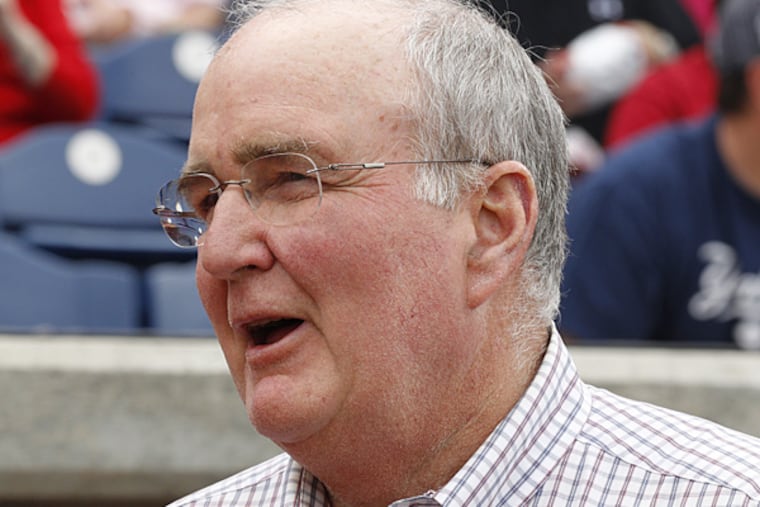Phillies pleased with new deal with Comcast SportsNet
President David Montgomery says $2.5 billion, $25-year deal should keep Phillies among the clubs with highest payrolls.

DESPITE a quiet offseason this winter, the Phillies have been among baseball's biggest-spending teams in the last half decade.
The Phillies' Opening Day payroll has been in baseball's top five in each of the last 4 years. In 2009, they were seventh (and third in the National League).
Following the agreement on a new local TV-rights contract with Comcast SportsNet on Thursday, the Phillies should have no excuses in remaining among the game's most aggressive spenders.
The new deal with Comcast SportsNet is for at least 25 years and in the neighborhood of $2.5 billion. It also includes the Phillies' obtaining an equity stake with the network.
Under terms of the new deal, in the upcoming season, some games will be broadcast on NBC10, which is under the same ownership umbrella, but games will no longer air on PHL17.
"We're very pleased," team president David Montgomery said in a phone call yesterday. "And I believe they are very pleased, too."
The numbers - 25 years and $2.5 billion - would translate into the Phillies' netting an average annual rights fee of $100 million. The team's previous deal with Comcast, which was set to expire after 2015, brought in an average annual rights fee of $35 million.
Quick translation: The Phillies roughly have $65 million more to spend each year. And that doesn't include the $24 million the team - along with the other 29 clubs in baseball - received this winter as part of Major League Baseball's new national television deal.
So the Phillies are on the cusp of going on a Los Angeles Dodgers-sized spending spree, right?
Not necessarily. The Dodgers' deal with Time Warner, which came with the creation of a Dodgers-centric regional sports network, nets the team an average annual rights fee of an astronomical $320 million.
Other recent local TV rights deals include the Texas Rangers and FOXSports Southwest (average annual rights fee of $150 million), the Los Angeles Angels and FOXSports West (also $150 million annually) and the Houston Astros with CSN Houston ($80 million annually).
"It might not represent quite a significant change as what has occurred in other markets," Montgomery said of the affect the TV contract windfall would have on team spending. "But we continue to believe, thanks to the tremendous fan support, that we'll continue to be one of the top five clubs in payroll each year . . . But, as we proved last year, payroll alone doesn't guarantee success. We want to focus on making the best player decisions possible."
According to Sports Business Journal, the deal nets the Phillies a sizable equity stake in Comcast SportsNet: 25 percent ownership.
The ownership stake in a TV rights deal is not unprecedented: The Angels also hold a 25 percent stake in FOXSports West, and the Astros hold 45 percent equity in CSN Houston, according to sportsbusinessdaily.com. Both the Angels' and Astros' local TV rights deals kicked in in 2013.
The Phillies' new deal with Comcast does not begin until 2016. Despite 2 years remaining on the current contract, both the Phillies and Comcast went to work in negotiating a new contract last February and continued to talk throughout the 2013 season.
"One of the strengths is we're blessed with the passion of a great sports marketplace," Montgomery said. "And [Comcast SportsNet] is an RSN [regional sports network] that hosts all of the teams. People go to CSN locally for their sports. So the strength overall in the market was certainly a factor as to whether to enter a new deal with them or look elsewhere . . . We just feel it's right for us."
The Phillies already have a hefty payroll in place with the likes of Ryan Howard, Cliff Lee and Cole Hamels on the roster. The new TV deal should allow for more flexibility, although that hasn't been demonstrated in the last 3 months.
The Phillies, who have shied away from bigger contract while instead signing the likes of Marlon Byrd and Roberto Hernandez off the free-agent market this winter, are on pace to open the 2014 season from $25 million to $30 million under MLB's $189 million luxury-tax threshold.
Blog: ph.ly/HighCheese